Welcome to Medicare Heads Up, a regular feature intended to deliver state and national Medicare-related headlines that will keep consumers abreast of developments that affect their coverage and costs. This week:
Medicare Advantage plans must loosen coverage rules in response to coronavirus crisis
The Centers for Medicare and Medicaid Services (CMS) is reminding Medicare Advantage plans and Part D drug insurers where they must loosen coverage and network rules in response to the coronavirus epidemic. Many states have declared health emergencies, and MA insurers operating in those states must allow enrollees to access MA services at Medicare-participating facilities outside the insurer’s network – while only paying in-network cost sharing. Insurers must also waive prior-authorization requirements during the emergency.
Additionally, CMS is encouraging but not requiring Medicare Advantage carriers to waive or reduce co-pays for coronavirus testing and other laboratory services, telehealth benefits, and other health services. The coronavirus test is covered at no cost under Original Medicare, while co-pays may apply in Medicare Advantage plans. CMS’ memorandum does not mean MA insurers will waive cost sharing associated with treatment – for example, those co-pays associated with an intensive care unit stay or rehabilitation facility visit – should you actually contract the coronavirus. (Original Medicare treatment costs are unchanged: you would owe a deductible of $1,408 with no additional daily Part A costs for the first 60 days of a hospital admission for coronavirus.)
Insurers respond to pressure by waiving co-pays
The Trump Administration and public health officials have encouraged insurers – including Advantage plan providers – to eliminate cost sharing and other treatment barriers in response to the coronavirus epidemic. Insurers – including some Advantage plans – have responded by agreeing to waive many of those co-pays and to encourage telehealth use.
Part D plan flexibility will allow patients to obtain extra medication fills
In addition to hospital and medical benefits, CMS is encouraging Part D insurers to waive early refill and supply limits and to support enrollees needing extended supplies of medication. Medicare Part D insurers must help patients fill their medications even if they are unable to access an in-network pharmacy during the emergency. (Using an out-of-network pharmacy means you have to pay the pharmacy’s list price for medications and may incur substantial out-of-pocket costs – even after your Part D insurer pays its share.) Part D insurers are also instructed to help beneficiaries access medications if they prefer not to physically travel to their pharmacy due to concerns about exposure to the coronavirus – for example, by using their retail pharmacy’s home-delivery service.
Coronavirus emergency response legislation temporarily boosts Medicare telehealth
On March 6th, President Trump signed the Coronavirus Preparedness and Response Supplemental Appropriations Act. The legislation expands Medicare telehealth coverage during the current emergency period for coronavirus declared on January 31. Medicare providers can now be reimbursed for telehealth services provided to a beneficiary at home, if the patient has already received Medicare-covered services from that provider’s practice during the last three years. Telehealth can be provided via cell phone as long as the phone has both audio and video communications capabilities.
Original Medicare previously limited telehealth coverage to rural areas and required that eligible beneficiaries travel to a designated site with video communications equipment in order to receive telehealth care. That requirement will once again apply after the coronavirus emergency period ends. Medicare Advantage plans have more flexibility to provide telehealth coverage both during and after the coronavirus emergency. Check with your carrier about your telehealth coverage options if you’re enrolled in Medicare Advantage.
Minnesota legislation would make Medigap plans available year-round
Bicameral legislation in Minnesota would make Medigap plan enrollment available year-round. Currently the state extends guaranteed issue rights to both aged and disabled enrollees for six months after they have Medicare Part B. If enacted, Minnesota would join New York and Connecticut in allowing year-round continuous Medigap open enrollment without underwriting. The legislation (SF3897 and HF4030) was filed in both the House and Senate and is now pending in the Senate Commerce and Consumer Protection Finance and Policy Committee. If you live in Minnesota, now would be a good time to contact your Representative or Senator to show your support for expanding access to Medigap.
New Hampshire legislation would provide a yearly Medigap open enrollment window
The New Hampshire Senate passed legislation to give Medigap enrollees a yearly window during their birthday month to switch to any other Medigap policy offered by their current insurer. The legislation would also prohibit Medigap insurers from charging disabled Medicare beneficiaries higher premiums once they reach 65. The state House now will need to consider legislation on this issue before it can be enacted into law. If you live in New Hampshire, you can contact your Representative to express support for the legislation. The proposed changes would take effect in 2021.
CMS announces Medicare Part D insulin coverage program
The federal government has announced that it will allow Medicare Part D insurers to offer plans with enhanced coverage of insulin. Insurers would cap beneficiaries’ insulin copayments at $35 per month year-round under the program. Part D plans currently can have different costs for medicines throughout the course of the year, and when prices rise or are unpredictable, they can be a barrier to filling needed medications. CMS proposes to allow Part D insurers to offer enhanced coverage for a broad set of formulary insulins from participating manufacturers. Some observers have warned, however, that the demonstration could raise Part D costs for beneficiaries who don’t need insulin. The program is optional and would be begin 2021.
Josh Schultz has a strong background in Medicare and the Affordable Care Act. He managed a Medicare ombudsman contract at the Medicare Rights Center in New York City, and represented clients in extensive Medicare claims and appeals. In addition to advocacy work, Josh helped implement federal and state health insurance exchanges at the technology firm hCentive. He also has held consulting roles, including as an associate at Sachs Policy Group, where he worked with insurer, hospital and technology clients on Medicare and Medicaid issues.
Tags: coronavirus, enrollment, insulin, Medicare Advantage, Medicare Heads Up, Medigap, Original Medicare










